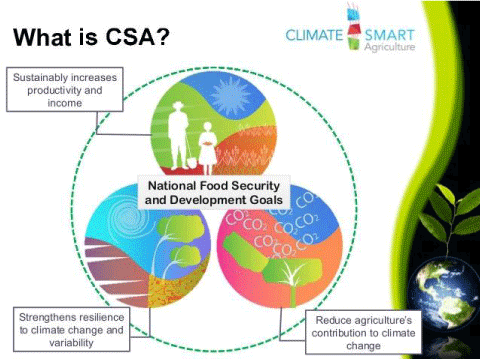Climate-Smart Crop Rotations And Diversification Strategies
Plant breeding plays a crucial role in addressing climate change, with the potential to revolutionize agriculture and contribute to building a more sustainable future. Through innovative techniques and research, plant breeders are working towards developing climate-resilient crops that can withstand extreme weather conditions and adapt to changing environments. The global significance of plant breeding in tackling climate change cannot be overstated, as it offers solutions to several challenges that agriculture faces in the context of a rapidly changing climate.

With the onset of climate change, farmers are experiencing more frequent and intense droughts, heatwaves, floods, and other extreme weather events. These climatic variations pose significant threats to food security and agricultural productivity. However, by employing effective plant breeding techniques, such as genetic modifications and selective breeding, scientists and researchers are working towards developing crops that can withstand these challenges.
One of the key aspects of plant breeding is the development of varieties that are resistant to drought. By identifying and incorporating specific genes that enable plants to tolerate water scarcity into crop varieties, scientists are enhancing their ability to adapt to arid conditions. This not only ensures food production in water-stressed regions but also minimizes the need for excessive irrigation, conserving valuable water resources.
Moreover, plant breeding also contributes to combating climate change by reducing greenhouse gas emissions. Agricultural activities, such as tilling the soil, contribute to the release of CO2 and other greenhouse gases. By breeding crops that require reduced tillage or by developing cover crops that capture atmospheric CO2, plant breeders can help mitigate climate change by minimizing these emissions.
What is remarkable about plant breeding is its potential to enhance the nutritional value of crops. Climate change not only affects crop productivity but also alters the nutrient content of plants. By breeding crops that are not only resilient to climate change but also nutritionally enriched, plant breeders can effectively combat food insecurity and malnutrition. For example, developing micronutrient-rich varieties of staple crops like rice, wheat, and maize can alleviate micronutrient deficiencies prevalent in many parts of the world.
Ideas for plant breeding in tackling climate change are diverse and innovative. One such idea is the development of climate-smart crop varieties. These varieties possess specific traits that enable them to adapt to changing climatic conditions, either by being more tolerant to heat, drought, or salinity, or by having a shorter growth cycle. By identifying and incorporating these traits into major crops, plant breeders can provide farmers with resilient varieties that can thrive in the face of climate change.
Another important idea is the promotion of agrobiodiversity through plant breeding. A diverse range of crop varieties helps ensure food security in the face of changing climate patterns. By breeding locally adapted varieties and incorporating wild crop relatives, plant breeders can contribute to the conservation of genetic diversity within crop species. This helps safeguard against the risk of crop failure and enhances the resilience of agricultural systems.
Recommendations for plant breeding in tackling climate change include fostering collaborations between breeders, researchers, and farmers. By working together, these stakeholders can share knowledge, resources, and expertise, thereby accelerating the development and dissemination of climate-resilient crop varieties. Additionally, policymakers should prioritize investments in plant breeding research and provide adequate funding to support this critical field.
Furthermore, it is imperative to utilize advanced technologies and tools in plant breeding. Advances in genomics, phenomics, and bioinformatics have revolutionized the way breeders understand plant genomes and traits. By incorporating these tools into breeding programs, plant breeders can expedite the development of climate-smart crop varieties, making them more efficient and precise in their efforts.
A listicle of successful examples where plant breeding has contributed to climate change adaptation and mitigation is both inspiring and informative:
- Breeding heat-tolerant wheat varieties that can withstand rising temperatures, ensuring a stable production of this essential staple crop.
- Developing drought-resistant maize hybrids that can continue to grow and produce high yields even under limited water availability.
- Breeding flood-tolerant rice varieties that can endure waterlogging and survive submergence for an extended period, mitigating the impact of periodic floods.
- Creating saline-tolerant legume varieties that allow for crop production in regions with high soil salinity, hence expanding agricultural possibilities.
- Developing disease-resistant potato varieties that reduce the need for chemical pesticides, minimizing environmental pollution and reducing greenhouse gas emissions from chemical use.
Question & Answer:
Q: How does plant breeding contribute to climate change mitigation?
A: Plant breeding contributes to climate change mitigation by developing crops that are more resistant to extreme weather events, reducing greenhouse gas emissions, and enhancing carbon sequestration through improved agricultural practices.
Q: What are the challenges faced by plant breeders in tackling climate change?
A: Plant breeders face challenges such as limited funding, policy support, and climate modeling uncertainties. Additionally, ensuring the accessibility and adoption of climate-resilient varieties by farmers in different regions remains a crucial challenge.
Summary of the global role of plant breeding in tackling climate change:
Plant breeding plays a vital role in addressing the challenges posed by climate change in agriculture. By developing climate-resilient crop varieties, plant breeders contribute to food security, mitigate greenhouse gas emissions, and enhance the nutritional value of crops. Through the adoption of innovative approaches and collaborations, plant breeding offers promising solutions to tackle climate change and build a more sustainable future for agriculture.
In conclusion, plant breeding has emerged as a powerful tool to tackle the adverse effects of climate change on agriculture. With its potential to develop climate-resilient crop varieties, enhance nutritional value, and reduce greenhouse gas emissions, plant breeding holds the key to a sustainable and secure food system. Continued research, innovation, and collaboration among breeders, researchers, farmers, and policymakers are necessary to leverage the full potential of plant breeding in overcoming the challenges posed by climate change.
Post a Comment for "Climate-Smart Crop Rotations And Diversification Strategies"